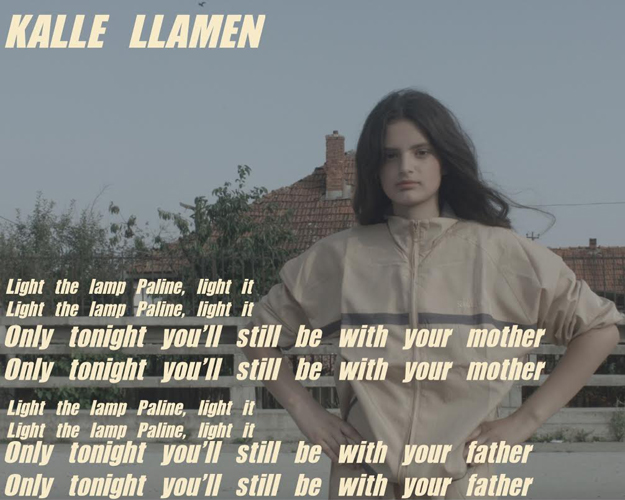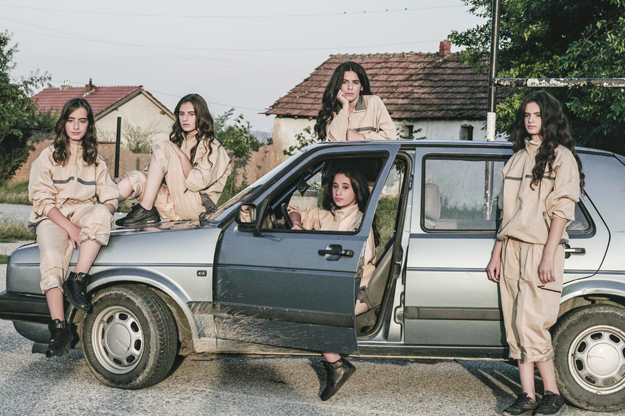The poster of Yasujiro Ozu’s cinematographic masterpiece Tokyo Story is easily recognisable on the wall of Fatime Kosumi’s Berlin apartment, as K2.0 catches up with the singer over Skype. The 1953 movie, which explores the story of family and relationships between past and present over different generations, greatly coincides with Kosumi’s work as well, who in her new project explores the impact of traditions and older generations on contemporary life.
The 36-year-old artist of Kosovo origin, who is also known as ANDRRA, released the video of her latest single “Kalle Llamen” on January 2, and it has quickly topped music charts in both Kosovo and Albania. The song is the first single of her upcoming album “Paline,” which tells the story of Albanian girls that are married off at an early age — a practice that persists across Albanian speaking regions.

ANDRRA’s latest single “Kalle Lamen” has topped charts in both Albania and Kosovo and features on her upcoming album, “Paline.” “Photos courtesy of ANDRRA”
The upcoming album, supported by the Berlin-based music producer and composer PC Nack, is comprised of five songs. The title song, “Paline,” is based on the story of 14-year-old Paline, the protagonist of an old folk song from Ulqin, who is being married off by her family. Throughout the album, ANDRRA uses lyrics taken from the traditional kanagjegj songs, which are sung to young brides by her relatives the night before the wedding.
A singer-songwriter and film producer, ANDRRA was born in Rosenheim, Germany, as the daughter of Kosovar Albanian parents. She left her German hometown in 2001 to move to Kosovo, where she lived until 2010. As Fatime Kosumi, she has been a well-known member of Kosovo’s pop music sphere throughout the decade.
“There is a transition from songs I made as Fatime Kosumi, and songs I make as ANDRRA,” she explains to K2.0 “Fatime Kosumi was everything — a compilation of genres. That is why I had the need to create an artistic name where I start from scratch.”
Her artistic identity as ANDRRA began after moving back to Berlin in 2011, and as her interest in old Albanian folklore lyrics — and for incorporating them into her own music — began to grow. She describes the result as “pop-avantgarde.”
“The folk music in the new album and ‘Kalle Llamen’ is only in the content, in the words,” ANDRRA says. “Nothing else is folk. Maybe occasionally there is an instrument, like fyelli (the traditional Albanian flute), but it comes in a very subtle form.”
Together with French filmmaker Vincent Moon (who has also worked with Arcade Fire, REM, Beirut and others), and with the support of the Musicboard Berlin state institution and the Municipality of Prishtina, she traveled across Kosovo in May 2014 to find and record almost forgotten old folk songs. They were particularly in search of a specific approach to folk music, that of rhapsodies sung by rural women. This search and journey will be depicted in a short documentary “Kang e Defa — Female Rhapsodies of Kosova,” which will be released alongside the album in May.
K2.0 talked to ANDRRA about her chart-topping single “Kalle Llamen,” her journey of discovering rhapsodies sung by Albanian women during wedding rituals and her ambition to see the social issues she addresses in her music such as child marriage become part of mainstream discourse.
K2.0: When did your interest in exploring the lyrics of Albanian folk music begin?
ANDRRA: Since I came [back] to Berlin, almost seven years ago. It was then that I started to listen more to Albanian music. When I lived in Kosovo, I didn’t listen to Albanian music.
It sounds like a nostalgia of an immigrant longing for home…
You start to feel love for your country, love for songs. Music is the thing that unites you with your country when you aren’t near. I always found folk music very interesting, but not in the same way as while [I’ve been] in Berlin. It is not that I liked it with a nationalist patheticness. But when I started listening to [folk songs] and analyzing them musically, I liked them because they are courageous as compositions. And they also reminded me of the storytelling in blues music, which I deeply like. It made me listen more to blues music, which reminded me of our country, our music. So I focused on songs of this kind, which for me are very similar to American blues that was mainly widespread in poorer areas and groups, same as with the rhapsody songs in Kosovo.
I also liked the lyrics because they were more sincere, more authentic. Rhapsodies are not necessarily beautiful, but they are genuine. And that is what I liked, the severe truth.
You paid particular attention to the rhapsodies sung by rural women…
I remembered some tapes that belonged to my mother, from when I was growing up in Germany. My mother had some tapes with songs with defa (traditional Albanian tambourines), which were sung by my cousins and recorded at different weddings of my relatives in Kosovo. But unfortunately, in that time, we were interested in anything other than the Albanian language and culture, and we didn’t speak Albanian very well. We didn’t understand anything from that [Albanian] music and replaced those recordings with Courtney Love and “Hair,” or whatever we liked at that time. I remembered those tapes two years ago, and now I regret that we don’t have them [anymore]. So those tapes have disappeared, they no longer exist. We have vanished them ourselves.
But then I started to research defagjikeve (women who play the Albanian traditional tambourine) songs on the internet, and I found many songs. So the idea for the documentary came about, as well as to travel through villages and to ask who knew those songs, so I could take them and create something new.
But we didn’t find many songs during our research. We found songs from different rituals that are part of the movie, but not kanagjegj songs, which were my main interest. Afterwards, I found many books published by Rilindja [publishing house] in the ’80s, with lyrics compiled by [writer and folklorist] Anton Ceta from different Albanian regions. There is no melody, rhythm, no idea how the song was, but at least it is known what kind of words it had.


